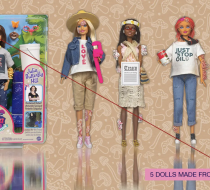Decomposable Barbie 1 Favorite
Barbie Hoax Targets Mattel and Fools Some News Outlets
The false campaign by environmental activists claimed that the toy giant was launching a new line of decomposable Barbies and would stop using plastic by 2030.
In an email, Mattel described the campaign as a “hoax” that had “nothing to do with Mattel.” The company said that the activists had also created fake websites made to look as if they belonged to Mattel. “Those were duplicates — not Mattel actual sites,” it said.
Climate Forward There’s an ongoing crisis — and tons of news. Our newsletter keeps you up to date. Get it in your inbox.
But some news outlets, including People, The Washington Times and MarketWatch, fell for the fake campaign, publishing articles on the new dolls. That seemed to raise questions about the ethics of spreading disinformation in the name of activism, especially as Americans’ trust in the news media is at a near-record low.
By Tuesday afternoon, the sites had removed the articles. The Washington Times also issued an editor’s note acknowledging its mistake.
“The Washington Times has confirmed from Mattel Corp. that the article about new Barbie dolls that appeared here was based on an elaborate media hoax involving spoofed email addresses, a faked news release, doctored images, fictitious quotations and a YouTube video that appears to show actress Daryl Hannah announcing the new product line,” the note said. “We have removed the story from our website pending further investigation into the origins of the hoax.”
Those behind the campaign described their actions as satire, rather than disinformation, noting that they had always planned to inform the public that Mattel had not been behind the announcement. “This is actually the type of action that opposes misinformation and disinformation,” Mike Bonanno, one of the activists, said by phone Tuesday.
“What we’re fighting against is half a century of misinformation from the plastics industry and from fossil fuel companies and interests that are trying to convince people that recycling is a viable solution to the plastic waste problem,” he added.
The campaign criticized Mattel’s role in pollution through its use of plastic in its dolls and other toys. Mattel does plan to curtail its use of plastic, but it stops well short of completely phasing the material out in its dolls.
The company announced last year that it planned reduce plastic packaging by 25 percent in each product by 2030. It also has a goal of using “100 percent recycled, recyclable, or bio-based plastic materials” in its products and packaging by the same time.
“Plastic is made with fossil fuels and comprises roughly six percent of global oil consumption,” according to the Massachusetts Institute of Technology’s Climate Portal. Most plastic waste, even if it’s intended for recycling, ends up in landfills or is incinerated, which contributes to climate change.
The campaign is the second time the activist group has attacked Mattel. In 1993, it bought “Teen Talk” Barbies and G.I. Joe dolls (made by Hasbro) and swapped the two dolls’ voice boxes out before replacing them on store shelves with the stated aim of calling the public’s views on gender and violence into question.
This time, the campaign shows the dolls and children who play with them throwing tomato soup at Van Gogh paintings and Molotov cocktails at President Vladimir V. Putin of Russia, set to a jingle about “corporate criminal sabotage.”
Ms. Hannah, the face of the campaign, said that while the vast majority of it had been fake, one element had been real: Around a decade ago, Ms. Hannah said, she found a barnacle-encrusted Barbie while snorkeling off the coast of Fiji.
“I find in the staghorn coral, while I’m diving, these little Barbie legs sticking out,” Ms. Hannah said. “She was just going to remain there forever.”
New York Times
By Livia Albeck-Ripka and Orlando Mayorquin
August 1 2023







